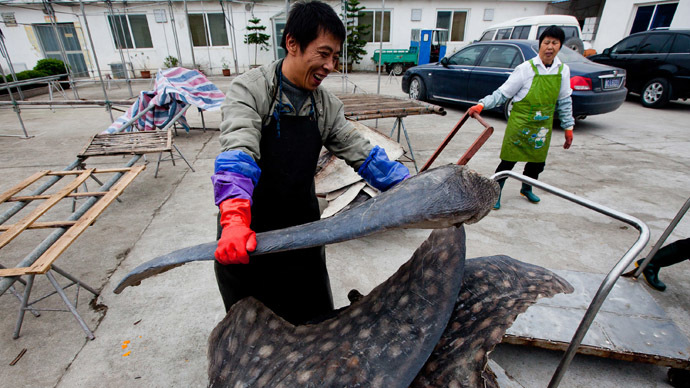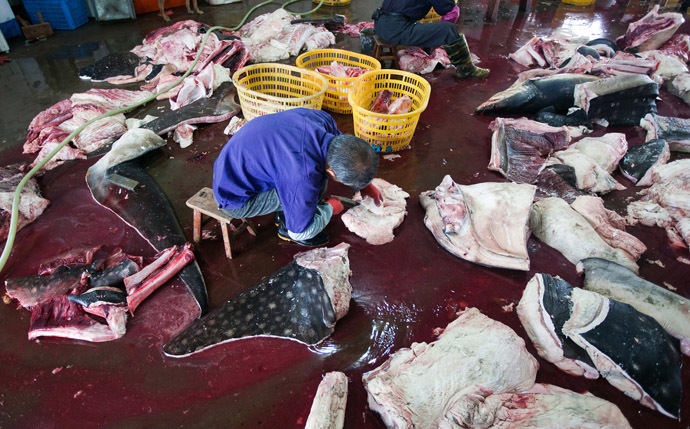World’s rarest shark falls victim to fish oil market

A Hong Kong-based wildlife conservation group has rung the alarm that a rare species, the whale shark, is falling prey to a growing US demand for fish oil products. The animal is illegal to catch in most places and illegal to process in China.
But the scene at one of the fish processing plants in China’s eastern Zhejiang province shows pools of blood, as workers attempt to process their annual estimated 600 whale sharks a year – and it is a lucrative business for the fishermen, bringing in a hefty 200,000 yuan ($31,000) for each shark, NGO WildLifeRisk wrote in an investigative report.
Alex Hofford and Paul Hilton of WLR, two activists who were contacted by a local conservation group, went to investigate several times, posing as buyers and armed with a camera and audio recording equipment.
They reported shocking findings. “It’s a lot of carnage in one place, a lot of damage. It was pretty overwhelming,” they said in a report released last week.
The animal, which can grow to a full 12 meters in adult form, is endangered. It is therefore forbidden to hunt them in most countries. But the fish continues to be hunted in the South China Sea, off the Chinese coast. However, it is a migratory animal and travels as far as Australia, the Philippines and Mexico.

The problem that keeps feeding the business is North America’s growing demand for fish oil products, which includes medicine, cosmetics and other products. The industry continues to boom, with prices almost quadrupling from 2009’s $620 per ton of fish oil to $2,100 in August 2013. In the last year alone, Americans are estimated to have bought $1.2 billion in fish oil products.
Compounding the problem is China’s domestic market, where the animal is valued for its fins and parts of its stomach, which are considered delicacies in Chinese cuisine. The meat is then sold to neighboring countries and restaurants around Europe, according to Li Guang, the manager at the plant, speaking to the NGO’s researchers. Probably unaware of the fact that he was being filmed, he also said that shark oil product containers are being mislabeled as tilapia – a common local fish.
China Whale Sharks from WildLifeRisk on Vimeo.
The whale shark is not the only species going under the knife. Blue and basking sharks form part of the 300-ton annual exports in shark liver oil.
All the species are protected in China; by law, they cannot be hunted without a special permit. The Basking and Whale sharks are listed by the intergovernmental convention on International Trade in Endangered Species of Wild Fauna and Flora (CITES) as being Appendix II animals: those that are not necessarily threatened with extinction, but nevertheless must be closely watched so that their slaughter and hunting does not impede the survival of the entire species.
The Great White shark is another species now being considered for the status.

WildLifeRisk believes something needs to be done to curtail the trade in order to protect the shark’s natural habitat. Activists believe the animal is worth far more alive than dead. They cite the Pew Environment Group: “In regions where whale sharks are known to aggregate, ecotourism has proven to be an extremely lucrative alternative to fishing. It has been estimated that whale shark tourism, mainly through recreational diving, is worth about $47.5 million worldwide.”
Something that can be done now, WLR believes, is to get consumers to change their attitudes toward whale shark liver products. Trading in the animal is not only unethical, but unsustainable, the organization believes. Therefore, individuals must take responsibility for breaking the law, they say.













